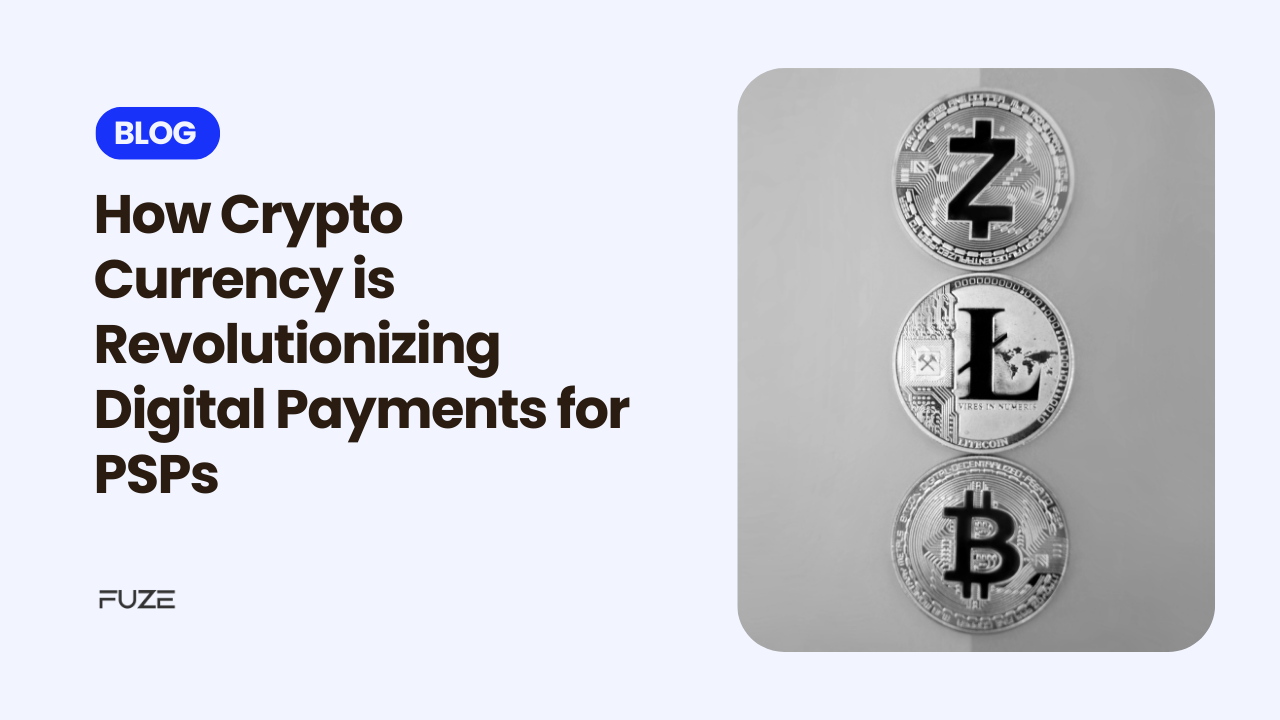The digital payments industry is in a significant shift with the emergence of cryptocurrency or digital assets. Decentralized virtual assets based on blockchain technology have introduced a new paradigm for financial transactions, disrupting traditional payment methods and creating new avenues for Payment Service Providers (PSPs).
In this blog, we will explore how cryptocurrencies are revolutionizing the digital payments industry. We will also examine the key benefits that PSPs can derive from adopting cryptocurrency, as well as the challenges and opportunities that lie ahead.
Understanding Cryptocurrencies and their Impact on Digital Payments
Cryptocurrencies are digital assets that operate on decentralized networks, eliminating the need for intermediaries. They utilize cryptographic techniques to secure transactions and create a transparent, immutable ledger on the blockchain.
Key Benefits of Cryptocurrency for PSPs
Cryptocurrencies offer a multitude of advantages for Payment Service Providers (PSPs), revolutionizing digital payments and bringing in new possibilities. These benefits include:
Reduced Transaction Costs: Cryptocurrencies often have significantly lower transaction fees compared to traditional payment methods, such as credit cards or bank transfers. This reduction in costs directly benefits both PSPs and their customers, improving profitability and enhancing competitiveness.
Faster Settlement Times: Blockchain technology enables near-instantaneous settlements for cryptocurrency transactions, significantly reducing the time it takes for funds to be transferred. This improved efficiency benefits both PSPs and their merchants, as it can lead to faster access to funds and reduced operational costs.
Increased Accessibility: Cryptocurrencies have the potential to expand access to financial services, particularly in underserved regions. By eliminating the need for traditional bank accounts, cryptocurrencies can empower individuals and businesses that may otherwise be excluded from the financial system.
Innovation and New Business Models: Cryptocurrencies enable the development of innovative payment solutions, such as decentralized finance (DeFi) applications and micropayments. These new business models can offer PSPs unique opportunities to differentiate themselves and capture market share.
Real-World Use Cases of Cryptocurrency in Payments

Cryptocurrencies offer innovative solutions across various industries, revolutionizing the way we transact. Here are some key real-world use cases:
Cross-Border Payments:
- Reduced Costs: Cryptocurrencies can significantly reduce the fees associated with cross-border transactions, making them more affordable for individuals and businesses.
- Faster Settlements: Transactions using cryptocurrencies can be settled in a matter of minutes or even seconds, compared to the days or weeks required for traditional bank transfers.
- Increased Accessibility: Cryptocurrencies can provide access to financial services in regions with limited banking infrastructure, enabling cross-border payments to underserved populations.
E-commerce:
- Expanded Customer Base: Accepting cryptocurrencies can attract a wider range of customers, including those who may be hesitant to use traditional payment methods or who reside in regions with limited access to traditional financial services.
- Reduced Fraud: Cryptocurrencies can reduce the risk of fraud by providing greater transparency and security for online transactions.
- Faster Processing Times: Cryptocurrency payments can be processed more quickly than traditional credit card payments, improving the overall customer experience.
Remittances:
- Lower Costs: Remittances using cryptocurrencies can be significantly cheaper than traditional methods, especially for international transfers.
- Faster Transfers: Funds can be sent instantly or within a few hours, providing a faster and more convenient way to send money to loved ones.
- Accessibility: Cryptocurrencies can provide access to remittance services in regions with limited banking infrastructure, empowering individuals to send money to their families and communities.
Micropayments:
- Efficient for Small Transactions: Cryptocurrencies are well-suited for micropayments, enabling small-value transactions that are often impractical with traditional payment methods.
- Subscription Models: Cryptocurrencies can be used for subscription-based services, allowing for recurring payments in a decentralized and secure manner.
- Gaming and Digital Content: Cryptocurrencies can be used to purchase in-game items, digital assets, and other virtual goods, creating new revenue streams for businesses.
Beyond These Use Cases:
Cryptocurrencies have the potential to transform various other industries, including:
- Supply Chain Management: Cryptocurrencies can be used to track and trace funds throughout the supply chain, improving transparency and efficiency.
- Loyalty Programs: Businesses can implement loyalty programs based on cryptocurrencies, rewarding customers for their purchases and encouraging repeat business.
- Decentralized Finance (DeFi): Cryptocurrencies are the foundation of DeFi, enabling innovative financial applications such as lending, borrowing, and derivatives.
The Future of Cryptocurrency in Digital Payments
The cryptocurrency landscape is rapidly evolving, with new innovations and developments emerging constantly. As a result, we can anticipate even more diverse and impactful applications of cryptocurrencies in the digital payments space.
Regulatory Clarity and Adoption:
As regulatory frameworks for cryptocurrencies become more established, we can expect increased adoption and mainstream acceptance. This will create a more favorable environment for PSPs to integrate cryptocurrencies into their offerings.
Interoperability and Cross-Chain Solutions:
The development of interoperability standards between different blockchain networks will enable seamless transactions and enhance the usability of cryptocurrencies. This will make it easier for PSPs to integrate multiple cryptocurrencies into their payment systems.
Decentralized Finance (DeFi):
DeFi applications built on blockchain technology are rapidly gaining traction. PSPs can explore partnerships with DeFi platforms to offer innovative financial services to their customers, such as lending, borrowing, and yield farming.
Tokenization:
The tokenization of assets, such as real estate or commodities, using blockchain technology can create new markets and investment opportunities. PSPs can play a role in facilitating these tokenization processes and providing payment services for related transactions.
Enhanced User Experience:
Continued advancements in user experience and interface design will make it easier for individuals and businesses to adopt cryptocurrencies. This will be crucial for driving wider adoption and increasing the demand for cryptocurrency-based payment solutions.
Conclusion
The future of digital payments is inextricably linked to the development and adoption of cryptocurrencies. As the cryptocurrency landscape continues to mature, PSPs that are able to adapt and innovate will be well-positioned to capitalize on the opportunities presented by this transformative technology. By embracing cryptocurrencies, PSPs can enhance their competitiveness, improve customer satisfaction, and drive the future of digital payments effectively.
Fuze, a leading provider of digital asset infrastructure, offers a comprehensive suite of solutions to enable businesses to seamlessly integrate crypto payments into their operations. With Fuze, you can accept crypto payments, send and receive crypto, store crypto assets, and explore DeFi applications.
Disclaimer: Virtual assets carry significant risks, including high volatility and potential loss of your entire investment. They are not backed by governmental protections, and recourse may be limited in case of loss. Always assess your risk tolerance, fully understand the risks, and seek independent financial advice if needed before investing.
Frequently Asked Questions
- How do crypto payments work?
Crypto payments involve the transfer of cryptocurrency units between parties using a digital wallet and the underlying blockchain network. Transactions are verified by a network of computers, ensuring accuracy and transparency.
- Are crypto payments secure?
Cryptocurrencies are generally considered more secure than traditional payment methods due to their transparency and use of cryptographic algorithms. However, it’s important to take precautions such as using strong passwords for wallets and storing your private keys securely.
- What are the benefits of using crypto payments?
Crypto payments offer several benefits, including faster transaction speeds, lower fees, global accessibility, and increased security.
- Are cryptocurrencies regulated?
The regulatory outlook for cryptocurrencies varies by country. Some countries have implemented specific regulations, while others have taken a more hands-off approach. It’s important to be aware of the regulatory environment in your jurisdiction and stay updated.







